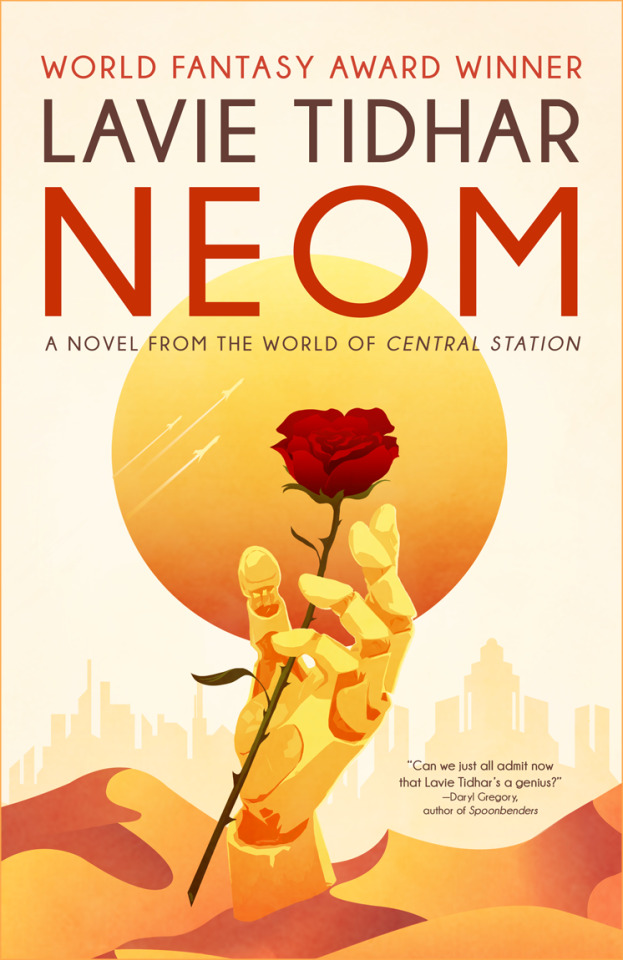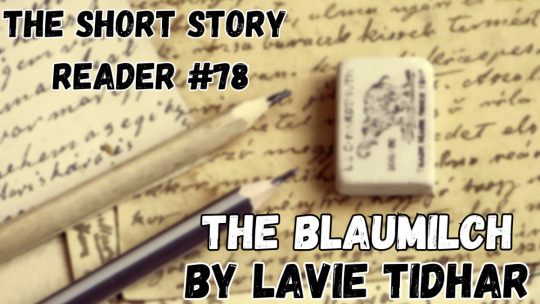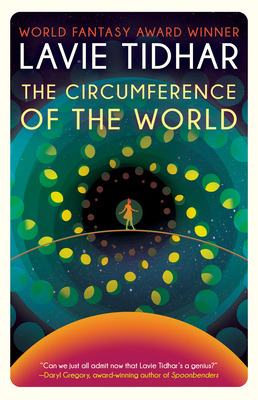#lavie tidhar
Text
#lavie tidhar#the circumference of the world#neom#book and film globe#best of 2023#Ambling Along the Aqueduct#Cat Rambo#rainbow war blog#David Agranoff#Postcards From a Dying World#Auraist#loontown#nir yaniv
4 notes
·
View notes
Text

If you’re in Luxembourg or anywhere nearby and don’t have anything to do on the 13 & 14.04, come join us at Luxcon with Samantha Shannon, Lavie Tidhar, Cheryl Morgan, Peadar Ó Guilín, and many more! I’ll be moderating a few panels and talking on a few others (in 3 different languages 😳) so if you like fantasy and scifi, don't miss out!
We'll publish the schedule soon, but in the meantime, we've got a ton of fun panels on diversity and representation, sciency stuff with real sciency experts, an awesome RPG session with some of our guests, and a special panel about mischief and cats 👀
#organising conventions is fun but also I never want to see another email ever again#samantha shannon#lavie tidhar#cheryl morgan#peadar o guilin#luxembourg#luxcon
2 notes
·
View notes
Text
fellow Dracula enjoyers: this short story is excellently funny and gently parodious
https://www.tor.com/2022/11/09/judge-dee-and-the-mystery-of-the-missing-manuscript-lavie-tidhar/
#dracula#re: dracula#dracula daily#bram stoker#vampires#lavie tidhar#short stories#paaa#wordsmithery
5 notes
·
View notes
Text

Gary K. Wolfe Reviews Neom by Lavie Tidhar
Neom, Lavie Tidhar (Tachyon 978-1-61696-382-8, $17.95, 240pp, tp) November 2022.
Every so often, arguments erupt on social media about whether it’s even worthwhile to read old-school ‘‘golden age’’ SF, given the vast cultural and demographic broadening of the field during the past few decades. It’s always struck me as an unnecessary dichotomy, since no two writers have the same set of ancestors anyway, and since it’s entirely possible to recognize the old while celebrating the new. A case in point is Lavie Tidhar, who has certainly promoted newer voices with his Apex World Science Fiction series of anthologies, and whose own fiction has been as adventurous and occasionally transgressive as anyone’s – but who clearly appreciates many of his more traditional forebears. His most direct engagement with classic SF themes was the series of stories knitted together in Central Station (2016), with its diverse cast of characters who live and work around a massive spaceport called Central Station in a future Tel Aviv, and whose stories gradually intersect. Tidhar returns to that world in Neom, but the setting has shifted to a huge, built-from-scratch metropolis on the eastern shore of the Red Sea, which is already ancient as the story opens. (As Tidhar tells us in a headnote, the city Neom is already under construction by Saudi Arabia, and a quick Google search of images reveals a whole passel of SF illustrations that don’t know they’re SF illustrations.)
As with Central Station, we’re introduced to a diverse group whose stories weave in and out of each other: Mariam de la Cruz, who lives in the poorer Nineveh Quarter of Neom and makes ends meet with a variety of jobs; her former childhood friend Nasir, a cop; Saleh, an orphan who joins a trading caravan, hoping to eventually make his way to Mars; Mukhtan, a trader in obsolete tech (he’s thrilled to have found an old Atari cartridge with Pac-Man); Sharif, a brilliant mechanic skilled in reviving ancient machines; Nasu, a centuries-old former ‘‘terrorartist’’; a talkative jackal, and a philosophical robot. While the first several chapters explore the setting and introduce the main characters – sometimes through lovely vignettes such as Mariam giving a single rose to the robot – the plot really begins to get underway after Saleh discovers a huge crashed spaceship in a desert already littered with dangerous mecha from earlier wars (much as in Cat Sparks’s Lotus Blue), and after the robot, for reasons not immediately clear, digs up the dismembered remains of a strange golden man. The mystery of the golden man eventually draws most of the characters together, as well as catching the attention of the ominous and still very dangerous Nasu.
At times Tidhar’s narrative takes on a gentle, ruminative air, and while that helps establish the atmosphere of a convincing, lived-in city, veteran SF readers will also find plenty of playful and affectionate Easter eggs. The various models of robots draw their names from Simak, Dick, and Bester (one of the ‘‘Fondlies’’ even gets overheated and goes on a killing spree); Asimov’s First Law of Robotics gets cited by that chatty, philosophical robot; hermit-like settlers are called Websters (as in Simak’s City); space is called the Up and Out (à la Cordwainer Smith); a cigarette brand is Ubiq; an ancient bioweapon is named Shambleau (from C.L. Moore, though we already met these in Central Station); there are even nods to a toaster on Mars (Disch) and four-armed Martian warriors (Burroughs, although they also show up in Tidhar’s Martian Sands). There are also sandworms, because why not? There’s still more, but it may be a tribute to Tidhar’s clear and engaging narrative voice that readers who notice none of these allusions won’t feel they’re missing anything. Nor is it necessary to have read Central Station, although it does help flesh out Tidhar’s emerging portrait of a transformed Middle East. For all its fearsome ancient ordnance, its economic disparity, and its looming threats, Neom easily joins the list of SF cities we’d like to visit.
3 notes
·
View notes
Text
0 notes
Text
“But Dad.”
“Yes, Bobbie?”
“Is this really real? I mean—“
“Would I lie to you, son?”
“No, of course not—“
“You’re my son, and I love you. People need to believe in something, Bobbie. Do you know what religion is, Bobbie? It is the sigh of the oppressed creature, the heart of a heartless works. Do you know who said that?”
“Uncle Bob?”
“No, not fucking Heinlein —look, I didn’t mean to swear. It was Karl Marx who said that, Bobbie.”
“Who?”
“It doesn’t matter. What I’m trying to sat to you is that— look. It gives comfort. It’s a story, everything is a story. Without stories we can’t really be human.”
“I don’t think I get it, Dad.”
Lavie Tidhar. The Circumference of the World. 2023, Tachyon.
#books and reading#books and libraries#books#authors#scifi#lavie tidhar#quotes#science fiction#stories
0 notes
Text
Понякога трябва да вярваш, че можеш да вярваш, понякога трябва да осъзнаеш, че раят може да дойде от другото човешко същество, а не само от хапче.
Понякога.
— Лави Тидхар. Централната станция
#lavie tidhar#central station#лави тидхар#централната станция#бг пост#бг цитат#български цитат#българско#bg post
1 note
·
View note
Text
The Short Story Reader #78 - The Blaumilch by Lavie Tidhar
Previous | Next
My first Tidhar story, “Unboxing“, was a technically flawless piece, and one of my favourite horror stories put by Apex Magazine this year. “The Blaumilch”, by contrast, is a hopeful piece. Tidhar introduces the reader to a future Mars and one of its inhabitants: Daud, a member of the Re-Born. Daud is adrift even by the standards of this group of “inevitably young, male, and…

View On WordPress
#fiction#Lavie Tidhar#literature#Mars#Philip K. Dick#Sci-Fi#Science Fiction#The Blaumilch#The Short Story Reader#Writing
0 notes
Text
Review: The Circumference of the World
Review: The Circumference of the World by Lavie Tidhar from Tachyon Publications
#Books #ScienceFiction #Recommended
Unexpected gems are one of the best things about life. Finding a craft beer bar in a strip mall surrounded by chains is exciting. The five dollar game bought impulsively on Steam that you’re still playing one hundred hours later is amazing. A book that surpasses and then reworks your expectations mid-read is beautiful. I recently read that book. It’s The Circumference of the World by Lavie…

View On WordPress
#Book Reviews#Books#Highly Recommended#Lavie Tidhar#Reading#Recommended#Review#Science Fiction#SF#SFF#Tachyon Publications#The Circumference of the World
0 notes
Text
#locus#best of 2023#peter s beagle#the essential peter s beagle#tobias s buckell#a stranger in the citadel#josh rountree#the legend of charlie fish#lavie tidhar#the circumference of the world
2 notes
·
View notes
Text

I'm gonna be a real adult with real adult responsibilities next weekend by being a panellist and moderator at Luxcon.
Yes, I'll be speaking in three different languages, yes, I'm basically doing the same panel in English and German, yes, I'll barely have time to breathe on Saturday. But I'm sure it's gonna be fun for everyone.
0 notes
Text
Spear as the future of Arthurian retellings
A video of beer and Arthuriana and deep analysis of the legend and its retellings over time. Also lots of lovely praise for SPEAR. Go watch. And cheers!
I just encountered an astounding (and long—nearly four hours!) exploration by Raf Blutaxt of Arthurian retellings through time. To give you an idea of it’s remarkable breadth and depth, here’s the YouTube listing:
How does one legend change through the ages? What do different authors do with a well-known story when they retell it? I may not have the exhaustive answer but certainly an exhausting…

View On WordPress
#arthuriana#bernard cornwell#lavie tidhar#matter of britian#Peretur#raf bluetaxt#Spear#video#youtube
1 note
·
View note
Text
ABMGW 219 Kurze Texte (Ivan Ertlov, Lavine Tidhar, K J Parker)
Thema der Woche: Viel Spaß für wenig Geld! Oder: Alternative Veröffentlichungsstrategien.
Den es gibt auch Autoren die kürzere Bücher schreiben können als 1000 seitige Trilogien, und es gibt Verlage die noch andere Preise kennen als 19,99€ für ein eBook.
Werke um die es hier geht:
“Mary Shane & die lüsternen Dimensions-Formwandler: Voller Körpereinsatz für die Gilde! (Ein Reverse Harem…

View On WordPress
#Dämonen#Exorzismus#Geschichte#Ivan Ertlov#Judge Dee#K J Parker#Lavie Tidhar#LitRPG#Novellen#Renaissance#Space Marines#Vampiere#Zombies
0 notes
Text

THE CIRCUMFERENCE OF THE WORLD by Lavie Tidhar
RELEASE DATE: Sept. 5, 2023
When a mathematician goes missing while searching for a legendary science-fiction novel, his wife hires a disabled book dealer to bring him home.
Maybe the universe’s energy really does get recycled, because this eclectic speculative novel manages to be simultaneously contemporary, nostalgic, and retro in a way that wouldn’t be unfamiliar to the SF icons to which it pays tribute. It’s a whodunit in structure but steeped in heavy philosophy with a few Beat flourishes to boot.
Delia Welegtabit grew up on a remote island where her proximity to the stars gifted her with a love of mathematics. In London circa 2001, Delia is married to Levi Armstrong, another young mathematician who dreams of making sense of the universe. After Levi disappears in search of a long-lost copy of an obscure 1962 SF novel called Lode Stars by Eugene Charles Hartley, Delia hires Daniel Chase, whose prodigious literary knowledge is blunted by his prosopagnosia (face-blindness), to find him. Immediately, Daniel is summoned by Oskar Lens, a shadowy underworld figure whose delusions and paranoia make him a very dangerous adversary indeed. Stylistically, we’re deep into Jonathan Lethem territory (Chandler-esque detective story with a heavy dose of weird) before Tidhar pulls back the curtain on the wizard himself, Hartley, whose book speculates that we’re all sentient memories swirling inside a black hole. Menace endures, as predatory parasites dubbed “eaters” prey on these sentient memories unless one possesses a coded copy of Lode Stars, which protects its charge. In a familiar turn, Robert Heinlein drunkenly suggests to Hartley that if he wants to make millions, he should really start his own religion, which inspires the author to found the Scientology-esque Church of the All-Seeing Eyes before disappearing himself. The plot may collapse into noodle-bending nonsense, but Tidhar’s rich portrayal of the pulpy golden age of science fiction, distinctive characters, and nimble turns of phrase make for a cool confection.
A nifty artifact about the perils and prognostications of the science fictional world.
0 notes